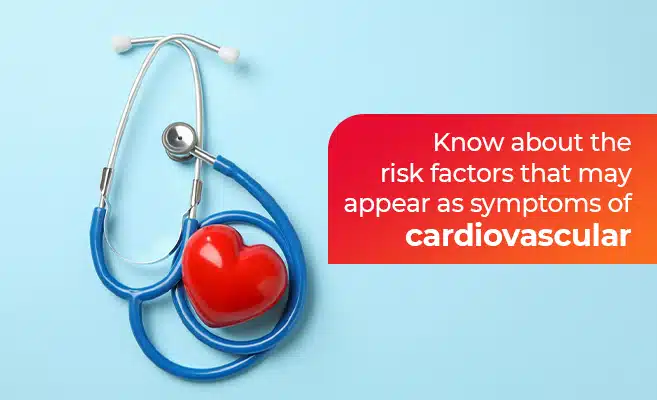What Are The 10 Risk Factors Of Cardiovascular Disease?

The world is observing several diseases flourishing globally after the COVID-19 outbreak. One such disease increasing day by day among people is cardiovascular disease. The risk factors for cardiovascular disease increase by a few particular behaviours, conditions, habits, or circumstances involving some common factors such as unhealthy eating, family history, diabetes, lack of exercise, smoking, and age.
Cardiovascular disease is the term used to represent all the situations affecting circulatory and heart systems. It includes heart attacks, coronary heart disease, stroke, and more. The chances of developing the heart disease risk factors are more if not given proper attention and care. These factors can get changed, treated, or modified. It can get controlled by changing the lifestyle and taking proper medications.
10 Risk Factors for Cardiovascular Disease
Mentioned below are some of the factors which lead to heart disease.
Hypertension or High BP
A heart attack, heart disease, or stroke increases if you’ve high BP. The risk also increases if a person is obese, have high blood cholesterol levels, or smokes. The normal blood pressure reading in a healthy adult in a resting state is 120/80. At the same time, it varies according to the age and activities performed.
High blood cholesterol level
The cardiovascular disease risk factors increase with an increase in blood cholesterol. Cholesterol is a substance similar to fat present in the blood. Excess cholesterol enters the body if you eat foods like eggs, meats, dairy products, or some foods with high saturated fat. The bad cholesterol in the blood is responsible for forming plaque on the artery walls. It causes a disease known as atherosclerosis. A person has a higher chance of getting a heart attack if the plaque forms inside the coronary arteries, which pass the blood to the heart.
Overweight or Obesity
Being overweight leads to several problems such as high blood pressure, high cholesterol levels, or diabetes. All these problems are responsible for increasing the heart disease risk factors. If you face obesity, you must follow a proper diet that includes more green vegetables and fruits. You should eat red meat, sugars and processed foods in a limited amount. You should also be involved in physical activities and exercises for 30 to 40 minutes a day.
Diabetes
Most people with diabetes die due to heart diseases. It happens especially in the case of people having adult-onset or Type 2 diabetes (non-insulin-dependent diabetes). The cardiovascular disease risk factor can get controlled by taking proper care. A person having diabetes should consult a doctor for better guidance. They can help control the body’s sugar level and reduce the risk of heart problems.
Age
The cardiovascular disease risk factors increase as people grow old. Nowadays, 4 out of 5 deaths caused in people around 65 are because of heart problems. The heart’s walls start to thicken, and arteries become hard and stiff as people get older. The blood isn’t pumped to the muscles of the body easily. These changes lead to more risks with increasing age.
Gender Identity
Females have fewer chances of having heart attacks in comparison to males. But when a woman reaches menopause, the differences become narrow, whereas the heart disease risk factors become almost the same after 65 in males and females. Females are more affected by cardiovascular diseases than males, while males get more heart attacks than females.
Smoking
Almost everyone knows that lung cancer increases by smoking tobacco and cigarettes. But very few people know that smoking can increase the risk of peripheral vascular diseases and heart diseases. Peripheral vascular disease is caused by the vessels responsible for supplying blood in the legs and arms. Smoking causes effects on blood vessels and the heart. Several people die because of smoking-related issues every year.
Sex hormones
In heart disease, sex hormones also play a role. Females ageing below 40 has rare chances of having heart diseases. They go through menopause between the age of 40 to 65. Around this time, the chances of getting a heart attack increase significantly. The ratio of females getting heart attacks after 65 increases upto half of all the victims.
Heredity
Sometimes heart diseases are hereditary. If the parents or siblings have a heart problem before age 55, then the risk factors for cardiovascular disease get increased within the upcoming generations. Other issues might also get passed within the upcoming generations, such as diabetes, obesity, etc.
Physically inactive
People involved in physical activities and exercises have fewer cardiovascular disease risk factors. Exercises help in maintaining good health and a balanced weight. They help in burning calories and controlling diabetes and cholesterol levels. By doing exercises, arteries are made more flexible, and the heart’s muscle gets stronger. Thus, it is essential to exercise regularly.
The Bottom Line
You can control and improve the heart’s health anytime because it is never too early or too late to start afresh. Some of the risk factors for cardiovascular disease can get controlled, while some can not. Therefore, you can control and enhance your health by removing the risk factors. By changing your lifestyle and managing good health, you can get many benefits. For getting proper treatment for heart diseases, visit the website.

 Book An Appointment
Book An Appointment Virtual Consultation
Virtual Consultation





